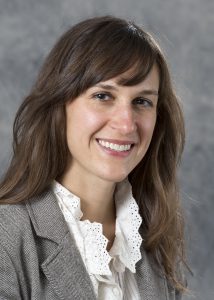Please tell us about your career pathway to date (positions and institutes).
I am an Assistant Professor of Nutrition in the School of Exercise and Nutritional Sciences at San Diego State University. I took a bit of a circuitous route to a PhD and an academic position, but ultimately this non-traditional path was instrumental in developing my research interests and honing important skills for career advancement. After completing a Bachelor of Science in Sports Medicine (University of Evansville) and a Master of Science in Human Movement Science, with a concentration in Health Promotion (The University of Memphis), I worked for five years as a Research Associate in the Arnold School of Public Health at the University of South Carolina, where I coordinated and disseminated theory-based interventions (as a part of randomized controlled trials) focused on nutrition and physical activity behavior change. After these five years, I knew that I wanted a solid foundation in the nutrition side of behavior change, so I went on to complete a PhD in Nutritional Sciences (specialization in Community Nutrition, minors in Human Development and Development Sociology) in the Division of Nutritional Sciences at Cornell University. With the intent to gain additional skills in population science, I then completed a two-year National Institutes of Health postdoctoral fellowship in nutritional epidemiology in the Department of Nutrition at Harvard Chan School of Public Health before accepting my current tenure-track position in 2018.
How would you briefly describe your current research/job to someone who is not familiar with your field of study/work? What is your main research interest?
My research employs social science perspectives to investigate how the stress of marginalization, especially food insecurity, gets ‘under the skin’ to impact cardiometabolic risk, as well as how this stress shapes food choice and dietary intake behaviors among low-income and racial/ethnic minority populations. Simultaneously, my research aims to identify existing assets within marginalized communities and populations that can be leveraged, as part of behavior-change interventions, to mitigate the stress of marginalization and promote nutrition and health equity.
What are the main barriers you encounter/experience when conducting research, or what information/skills do you lack to conduct high quality research?
As a tenure-track faculty, the three main barriers I face are 1) balancing research, teaching, and service responsibilities; 2) systematically working towards a long-term vision for my research program; and 3) securing consistent funding. The beauty of a traditional tenure-track faculty position is the opportunity to contribute to the university as a teacher, scholar, and colleague, but it also translates to competing demands of my time and to a constant need to re-calibrate to ensure I am fulfilling all of my different roles. This balance is even more complex as an early career faculty, as I am still learning the best way to thoughtfully navigate my research activities in the present so that they meaningfully contribute to my long-term research program trajectory. And, of course, none of this would be possible without grant funding. Last year, I was fortunate to receive a 5-year career development award from the National Institutes of Health, which protects my time for research. Yet, in the years preceding this award I submitted many proposals that were not funded. Even with four years left on my current award I am already developing goals towards the next big grant application.
What could help you as a student/ECR to further develop/grow in your current position?
As an ECR, I am fortunate to have a team of diverse mentors that I can turn to for different types of support and guidance. At the same time, I am constantly seeking additional opportunities to establish new mentoring relationships and to receive training on how to best position myself for sustained success (see my #2 barrier above), both of which are essential for my growth and progress.
What do you think will be the next most important development in the nutrition and/or physical activity field?
As a health and nutrition equity researcher, I believe the growing push across institutions and sectors to promote diversity, equity, and inclusion has the potential to meaningfully impact health and nutrition disparities, not only by prioritizing and funding research and programming that can directly benefit marginalized populations, but also by employing a more coordinated, inclusive effort to support and train underrepresented minorities, who bring valuable knowledge, skills, and perspectives to reduce inequities. This latter mechanism is particularly important within nutrition research if we want our diverse future generations to be healthy.
You can get in touch with Amanda via email amcclain@sdsu.edu or Twitter @amandacmcclain


